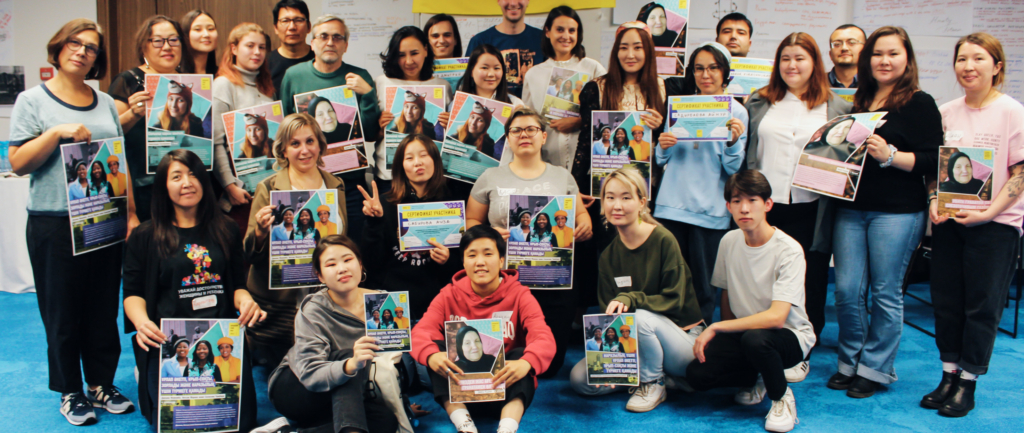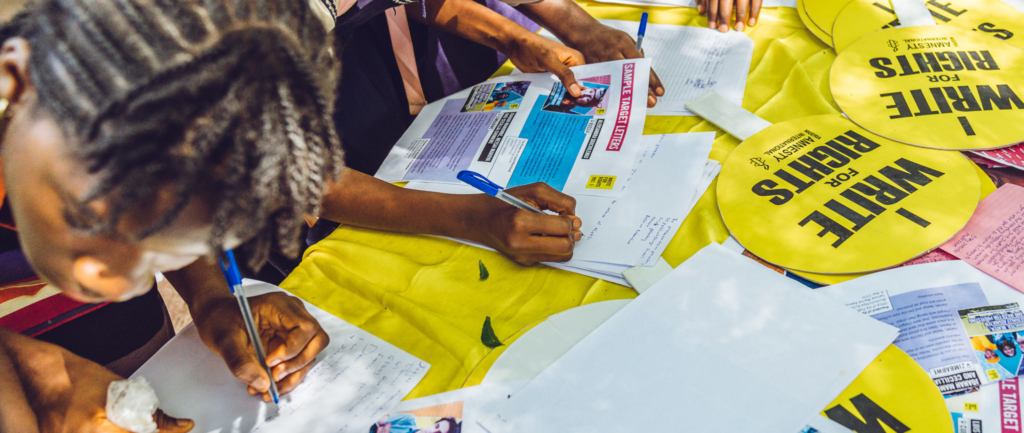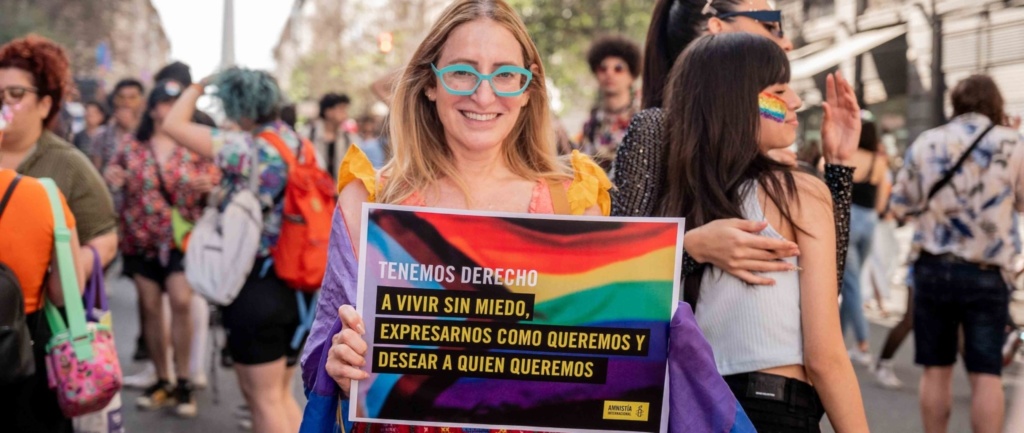Human Rights Education (HRE) represents a central pillar of Amnesty International’s steadfast commitment to justice, equality, and the enduring pursuit of societal change.
In 2022, Amnesty human rights education teams worked with local partners, communities, and activists to support the development of knowledge and understanding of human rights. Through our HRE work, we reached millions of people.
In this article, we provide some insights through Amnesty International’s results-oriented and passionately executed HRE initiatives. These initiatives are carefully crafted to instil foundational knowledge and empower individuals and communities to know and assert their rights, leaving no room for indifference. In 2022, the unwavering dedication of Amnesty’s human rights educators resulted in remarkable outcomes, empowering diverse audiences, and forming impactful partnerships.
Holistic and Results-Oriented Human Rights Education

Amnesty International’s approach to Human Rights Education is comprehensive and driven by a commitment to tangible transformation. The methodology is rooted in the understanding that HRE transcends theoretical learning; it seeks concrete results. Here is a glimpse of how HRE colleagues and their partners achieved this:
Foundational Knowledge and Supported Action: In 2022, Amnesty executed 55 projects that transcended the mere dissemination of information, they enabled learners to increase knowledge and understanding of rights. They introduced human rights principles as practical tools to protect and assert rights. A notable instance was their collaboration with the Indigenous community association, Associação Kowit, in Brazil through continuous training and capacity building on various Human Rights issues. This collaboration laid the groundwork for Indigenous communities to become advocates for their rights.
Mobilization and Informed Action: The influence of 63 HRE projects in 2022 extended beyond foundational knowledge, to empower learners to take informed action. Amnesty International Mexico, for instance, through the “Vivan las Mujeres” Network worked with activists to amplify the cause of women’s rights. They did not merely educate; they mobilized, raised awareness, and inspired action, meaning that our targeted groups acquired knowledge and skills on human rights, which helped them to increase the legitimacy of their work on the ground.
Transformational Change and Mobilization of Others: For us transformational change implies that our targeted groups are able to carry out their own human rights education to equip others with human rights knowledge and skills, leading and accompanying others in acting for human rights. In our reporting year, 23 projects achieved transformational change. For example, Amnesty International Benin’s school clubs epitomized transformation in practice. These student-led clubs were not passive learners; they actively identified pertinent issues, harnessed Amnesty’s resources, and initiated change. For instance, the Akodena Secondary School in southern Benin collaborated with school leaders to advocate for a cleaner and healthier environment, exemplifying the transformative potential of education.
Working with Diverse Audiences
Amnesty’s dedication to building rights respecting societies through education is both far-reaching and diverse. It extended across national boundaries, embracing individuals and groups across the spectrum of age, gender, and discrimination. Diversity was not an afterthought; it was integral to Amnesty’s education mission. In 2022, Amnesty’s HRE sought to address the needs of individuals and groups confronting various forms of discrimination, with:
64% of projects addressed the concerns of groups experiencing discrimination, including issues related to gender, sexual orientation, and age. HRE did not shy away from confronting pressing challenges.
The 2022 State of Human Rights Education Report
HRE’s approach was inclusive and diversified, addressing the distinct needs of individuals and groups. It was recognized that justice cannot be a one-size-fits-all endeavour. Engagement was not merely a statistic; it was an affirmation of the passion Amnesty instilled. Participants actively chose to take part in Amnesty’s HRE activities, engaging within educational institutions, and taking substantial action, all fuelled by a deep-seated inspiration.
Partnerships: Amplifying Impact

Partnerships and collaborations were instrumental in amplifying the impact of Amnesty International’s HRE efforts. Our work in 2022 illustrated the transformative potential of collective action:
- In 80% of HRE projects, Amnesty collaborated with partners, recognizing the enhanced reach and influence that resulted from collective efforts. The underlying principle was that together, they were stronger.
- In 43% of HRE projects, partnerships were not an afterthought; they were an integral component of the project cycle. HRE colleagues at all levels of the organisation acknowledged that to effect real change, working in isolation was inadequate.
Local partners were not merely valuable; they were irreplaceable. These partners understood the pulse of their communities and tailored HRE to meet the unique local needs. These collaborations were the driving force behind locally initiated change, ensuring that communities could assert their rights effectively.
Partnerships, which encompassed local and international philanthropic trusts, foundations, as well as governments, underscored the collective commitment to expanding the reach of HRE.
In 2022, we engaged with over 4 million people across 61 territories through HRE.
The 2022 State of Human Rights Education Report
HRE took place in both non-formal spaces and formal education settings. We worked in communities, with youth groups, online learners and activists. Our interventions also included schools, teachers, and students at all levels of education. Over 56% of HRE projects were conducted within formal educational settings, such as schools, colleges, or universities, and 41% of their entities reported the inclusion of HRE in formal curricula within their respective nations.
Conclusion
The reach and impact of Amnesty International’s HRE is a testament to the passion of Amnesty’s human rights educators, and their commitment to quality, inclusive and results-oriented approach to education for and about human rights.
Amnesty is more than just an organization; it is a movement fuelled by both passion and tangible results. In a world often tainted by apathy and ignorance, Amnesty International’s HRE initiatives shine as a beacon of hope, illuminating the path toward a more equitable and enlightened future. The commitment to justice, diversity, and collaborative action is unwavering, and it leaves an indelible mark on the world of the learners we reach, their communities and wider society.
To access the full report, click on this link; https://www.amnesty.org/en/documents/pol32/7160/2023/en/



